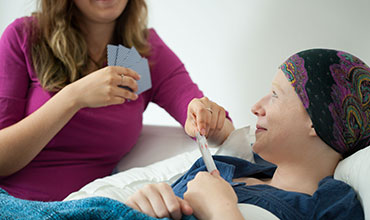Sexual Health, Suicidal Ideation and weight changes in Cancer patients during Chemotherapy and Radiotherapy Treatment

Abstract:
Background: During chemotherapy or radiotherapy sessions, cancer patients often go through
a series of physical, psychological, social and environmental changes that affects
the QOL of the patients. While assessing for the anxiety and depression scores affecting
the QOL, maximum of the patients left the question of sexual activity, suicidal
ideation and weight issues unanswered.
Objectives: The present paper focused on the issue of sexual activity, suicidal ideation,
and weight changes during chemotherapy or radiotherapy sessions while determining
the anxiety and depression scores for QOL of cancer patients during the treatment
regimen.
Methods: It was a cross-sectional, descriptive, hospital based evaluation study. Total
duration of the study was 5 months (December 2015- April 2016), conducted in Medical
and Radiation Oncology department of Dr. B.L. Kapur Memorial Hospital, New Delhi,
India. A convenience sample of 60 patients (Chemotherapy group (n= 30) and Radiotherapy
group (n= 30)) with cancer was selected. Data was obtained through direct interview,
using validated Psychological intervention tool in the form of Questionnaire: WHOQOL-Bref
Questionnaire, Zung Self-Rating Anxiety scale and Zung Self-Rating Depression scale,
which was further managed through a statistical program, using appropriate statistical
tests.
Results: A total of 60 cancer patients were included in the study in which Chemotherapy
group consisted of 30n cancer patients and Radiotherapy group consisted of 30n cancer
patients. In the study, 6(20%) were males and 24(80%) were females in the chemotherapy
group, and, 15(50%) were males and 15(50%) were females in the radiotherapy group.
Majority of the patients 32(53.34%) were in the age range of 46-60 years.
Conclusion: It could be concluded from the present study that in Indian scenario, cancer
patients felt sexual activity and suicidal ideation as a social stigma which is
further accompanied by hesitation. Moreover, maximum patients observed stable weight
and some patients observed increase in weight during chemotherapy sessions.
Keywords: Cancer, Chemotherapy, Radiotherapy,
Quality of Life, missing values, sexuality, suicidal ideation, weight increased,
weight stability.
References:
[1]. Deshpande, P. R., Sheriff,
M. K., Nazir, A., Bommareddy, S., Tumkur, A., Naik, A. N. (2013). Patient-reported
quality of life outcomes in Indian breast cancer patients: Importance, review of
the researches, determinants and future directions. J Can Res Ther, 9 (1), 11-6. Doi: 10.4103/0973-1482.110341
[2]. Fobair, Patricia, L.C.S.W., Spiegel, David.
(2009). Concerns about Sexuality after Breast Cancer. The Cancer Journal, 15(1), 19-26. doi: 10.1097/PPO.0b013e31819587bb
[3]. http://journals.lww.com/journalppo/Abstract/2009/02000/Concerns_About_Sexuality_After_Breast_Cancer.5.aspx
[4]. Hughes, Mary, K., M.S., R.N. (2000). Sexuality
and the Cancer Survivor: A SILENT COEXISTENCE. Cancer Nursing, 23(6), 477-482.
[5]. http://journals.lww.com/cancernursingonline/Abstract/2000/12000/Sexuality_and_the_Cancer_Survivor__A_SILENT.11.aspx
[6]. Sunderam, S., Haider, S., Kumar, M., Kashyap,
V., Bhushan, S.S., S.J. (2015). Assessment of quality of life of cancer patients
attending oncology clinic in a tertiary care hospital of Jharkhand, India. International Journal of Community Medicine
and Public Health, 3(1), 281-286.
[7]. http://www.ejmanager.com/mnstemps/109/109-1446880098.pdf?t=1468312514
[8]. WHOQOL Group. (1998). Development of the
World Health Organization WHOQOLBREF quality of life assessment. Psychol Med, 28:551–8.
[9]. Zung, W. W. K. (1971). A rating instrument
for anxiety disorders. Psychosomatics, 12(6), 371–379. Available at: https://psychology-tools.com/zung-anxiety-scale/
[10]. Zung, W. W. K. (1965). A Self-Rating Depression Scale. (1965). Arch Gen Psychiatry, 12: 63-70. Available at: https://psychology-tools.com/zung-depression-scale/

